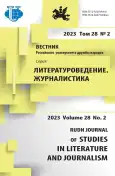Challenging Eurocentric narratives: a postcolonial feminist analysis of the lives and experiences of Third World women
- Авторлар: Rather N.A.1
-
Мекемелер:
- Indian Institute of Technology Jammu
- Шығарылым: Том 28, № 2 (2023)
- Беттер: 271-283
- Бөлім: LITERARY CRITICISM
- URL: https://journal-vniispk.ru/2312-9220/article/view/318903
- DOI: https://doi.org/10.22363/2312-9220-2023-28-2-271-283
- EDN: https://elibrary.ru/PNQBLT
- ID: 318903
Дәйексөз келтіру
Толық мәтін
Аннотация
The ideas of Chandra Talpade Mohanty, a leading postcolonial feminist scholar, are explored. Attention is drawn to the criticism of Western feminist scholarship by postmodern and postcolonial feminists for its tendency to assume that the experiences of Third World women are universally and essentially same, ignoring the diversity and complexity of their lives. In an effort to better understand and give voice to the variety of experiences among Third World women, these feminists have sought to challenge misleading stereotypes that depict them as helpless, submissive, and oppressed. The importance of recognizing that the lives and experiences of Third World women are shaped by a multitude of factors, including cultural customs, language, history, education, family dynamics, societal values, religion, racial identity, social class, politics and economic status is emphasized. The novel Women at Point Zero is analyzed to illustrate how all these factors in combination play a role in defining the lives and experiences of Third World women. Through this analysis, Eurocentric narratives are challenged and their limitations are exposed. It is also shown how Firdaus, a character in the novel, opposes and subverts essentialist and stereotypical views of women from the global South as passive and oppressed.
Негізгі сөздер
Авторлар туралы
Nadeem Rather
Indian Institute of Technology Jammu
Хат алмасуға жауапты Автор.
Email: nadeem.rather@iitjammu.ac.in
ORCID iD: 0000-0003-1448-7836
Ph.D., research scholar, Department of Humanities & Social Sciences
NH-44, PO Nagrota, Jagti, Jammu and Kashmir, 181221, Republic of IndiaӘдебиет тізімі
- Abu-Lughod, L. (2002). Do Muslim women really need saving? Anthropological reflections on cultural relativism and its others. American Anthropologist, 104(3), 783-90, http://doi.org/10.1525/aa.2002.104.3.783
- Althaus, F.A. (1997). Female circumcision: Rite of passage or violation of rights? International Family Planning Perspectives, 23(3), 130-33. http://doi.org/10.2307/2950769
- El Saadawi, N. (1983). Woman at point zero. Zed Books.
- Liddle, J., & Rai, S. (1998). Feminism, imperialism and orientalism: The challenge of the ‘Indian Woman’. Women’s History Review, 7(4), 495-520, http://doi.org/10.1080/09612029800200185
- Mahmoud, T., & Sarhan, A. (2011). Voicing the voiceless: Feminism and contemporary Arab Muslim women’s autobiographies. Graduate College of Bowling Green State University. http://doi.org/10.13140/RG.2.2.24349.44006
- Mohanty, C.T. (2020). Under Western eyes: Feminist scholarship and colonial discourses. Colonial Discourse and Post-Colonial Theory, 30(30), 208-232. http://doi.org/10.4324/9781315656496-24
- Said, E. (1979). Orientalism. 25th ed. Vintage Books.
- Sandy, K., & Ouardi, E.L. (2019). Third World women representation in Western feminist discourse: A critical study. Arab World English Journal For Translation & Literary Studies, 3, 127-135.
- Spivak, G. (1999). A critique of postcolonial reason: Toward a history of the vanishing present. Harvard University Press.
- Syed, J., & Ali, F. (2011). The white woman’s burden: From colonial civilisation to Third World development. Third World Quarterly, 32(2), 349-65, http://doi.org/10.1080/01436597.2011.560473
- Wood, C.A. (2001). Authorizing gender and development: ‘Third World Women’, native informants , and speaking nearby. Nepantla: Views from South, 2(3), 429-447.
Қосымша файлдар









